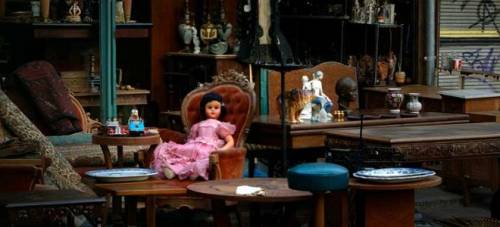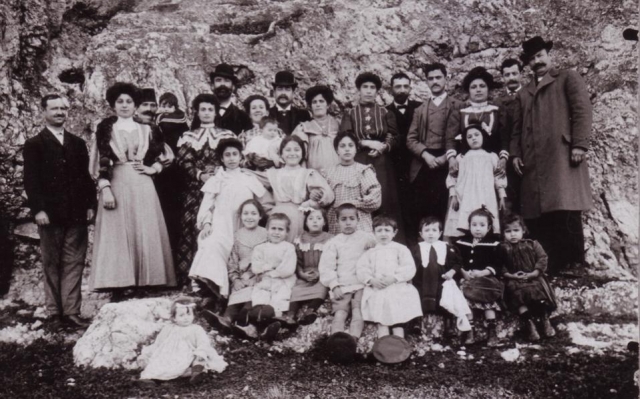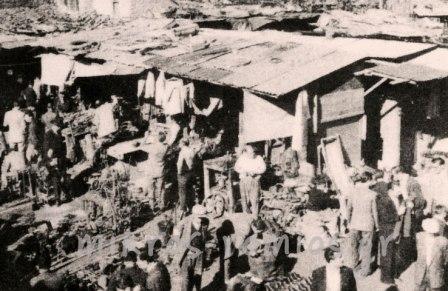Zdravka Mihaylova
The historic centre of Athens hides many hidden "treasures" that are awaiting their discoverers. A walk at the foot of the Acropolis, in the heart of Monastiraki - passing by the mosque of Tzistrakis (1759) from the Ottoman era in the square with the same name, today sheltering the Museum of Greek Folk Art and a collection of ceramic art, the ancient Greek and Roman Agora, the Library of Hadrian and others, would take you to Avyssinias Square (πλατεία Αβυσσινίας) that since 1910 has been the location of the Athens’s antique market, known as "Yussuroum" (Γιουσουρούμ). In the multinational mosaic of this emblematic place of the Greek capital, it is hard to find free valences of xenophobia: various ethnicities and religions have coexisted in harmony there for years. Not far from Pantanassa church (combining divine services following the Catholic and Orthodox rituals), on Melidoni Street you can find the temple of Judaism, Athens synagogue. One of the descendants of the Jewish community in the city, Yussuroum, gave the name to Athenian realia, which have been a symbol of multi-ethnic "commercial" pluralism even to the present day.

Colourful goods that can be seen and purchased at the market today.
Athens has its own urban legend associated with a Jewish family, Yussuroum, just like the Modiano family is related to the unique architectural heritage of Thessaloniki - the covered market is named after it and the market hall is known as the "Modiano roof market" named after its creator, engineer Eli Modiano. The stories about Athens and its people are endless. Many of them have faded from memory over time and others are remembered in fragments. A family name however, has remained in current use: in Greek Yussuroum has acquired the meaning of "antique market" and is synonymous with "flea market".
Athens newspaper Kathimerini journalist Nikos Vatopoulos reports on an event that the Jewish community in Athens organized in October to honour a descendant of the family, 95-year-old Mois Yussuroum. A garden in the community’s synagogue was named after the famous benefactor and donator of the community, and the event, held on the initiative of the Jewish Museum in Athens, was an occasion to shed new light on the history of the Yussuroum family.

Group photo of the Yussourum, Habib and Cohen families in the Athens neighbourhood Thisseiο taken around 1914. Bohor Yussourum’s five children are in the back row: Ilias (with a moustache and hat), Chaim, Iakovos, Moysis, Noah, with their wives and their children, the third generation of the family. In the middle is Noah Mazaltov’s wife (her maiden name was Habib), with newborn Isaac in her arms.
While many Greeks use the term "yussuroum" (Γιουσουρούμ) when referring to the flea market in Athens, few know that it stems from this family, and, in particular, from the antique market it created in the Jewish quarter of central Athens, between Agion Asomaton Square and Sari and Ermou Streets. Mois Yussuroum is the descendant of a long line of successful merchants with a presence in Athens. The Yussuroum home on the corner of central Karaiskaki and Ermou Streets was located in the heart of Athens’s commercial district and once sheltered the first Jewish house of prayer in the capital.
Like many Sephardic families in Greece, the older limbs of the Yussuroum family came from Spain after being expelled by the Catholic King Ferdinand and Queen Isabella in 1492. The Yussuroums first settled in Smyrna (now Izmir in Turkey) as the Ottoman Empire had opened its gates to the Jewish communities exiled from the Iberian Peninsula. Their significant contribution to the Ottoman Empire and the countries that emerged from its collapse was mainly due to that wave of emigration from the Iberian Peninsula to the Levant in the 15th century.
When the modern Greek state was created in the 19th century, one of the Yussuroums, Isaac, moved to Chios in 1830, when the island was still under Ottoman rule. The family moved to the Aegean island of Kythnos in 1860 and Isaac’s son, Bohor, a tailor by profession, later decided to move to the capital of the Kingdom of Greece, settling in Athens in 1863.
 View of the market in the good old days.
View of the market in the good old days.
Bohor, Mois’s grandfather, opened a clothing shop on the corner of central Athens Karaiskaki and Ermou Streets. "My grandfather was a tailor but people did not have a lot of money at the time and they bought secondhand clothes," says Mois. "He would alter used clothes and display his goods every Sunday in Avyssinias Square, at the bazaar." Everyone else was selling antiques, which is why the phrase "going to Yussuroum" denotes both the flea market and antique shops. Bohor had seven children in Athens. After his death in 1887, his eldest son, Ilias expanded the business and became a pillar of the Athens Jewish community. Ilias’s younger brother, Noah, Mois’s father, married Mazaltov Habib, an Athenian Jew, and tried to take advantage of the many opportunities that opened up in Greece after the Balkan Wars. He moved to Thessaloniki, where he opened a hospital supplies firm with Abraham Nahmias but the massive fire of 1917 that wiped out almost the entire Jewish quarter in the city foiled his plans and forced him to move back to Ermou Street in Athens, though to number 84.
At the recent event, Mois Yussuroum reminisced, "My father opened his shop when he returned from Thessaloniki together with a partner, Spyros Kourousis. During and especially after the First World War, my father would go to all places where there were troops of the Entente - French or British - and buy military material, from tents to uniforms, bring them back to Athens and sell them." Noah Yussuroum was an auction hunter, travelling from France to Egypt to bring back stock for his shop. In 1924-1925 he struck gold at an auction of materials from the old royal palace (now the Greek Parliament) after Greece was first declared a republic. He built a new house in Thisseio neighbourhood, not far from the Acropolis, and decorated the balconies on the second floor with Stars of David.
Noah and his wife had two children, Isaac and Leon, in Thessaloniki and four more in Athens, born between 1920 and 1929. Mois was the eldest and he and his brother Iakovos fought in the Battle of Crete (May 1941) against the Germans and then joined the National Liberation Front (EAM) and fought in the resistance. "My brothers in arms did not know that I was a Jew," says Mois, "as I used the name Yorgos Gazis, in case I was captured as a prisoner of war." After the war, Noah’s children took different roads: Mois became a dentist, Isaac a civil engineer, and Leon and Iakovos went into the iron business and opened a shop on Ermou Street. Mois Yussuroum is a living witness to a long family tradition that is intrinsically linked to Athens’s commercial life, leaving a trail in the Jewish community of the city as a donator.